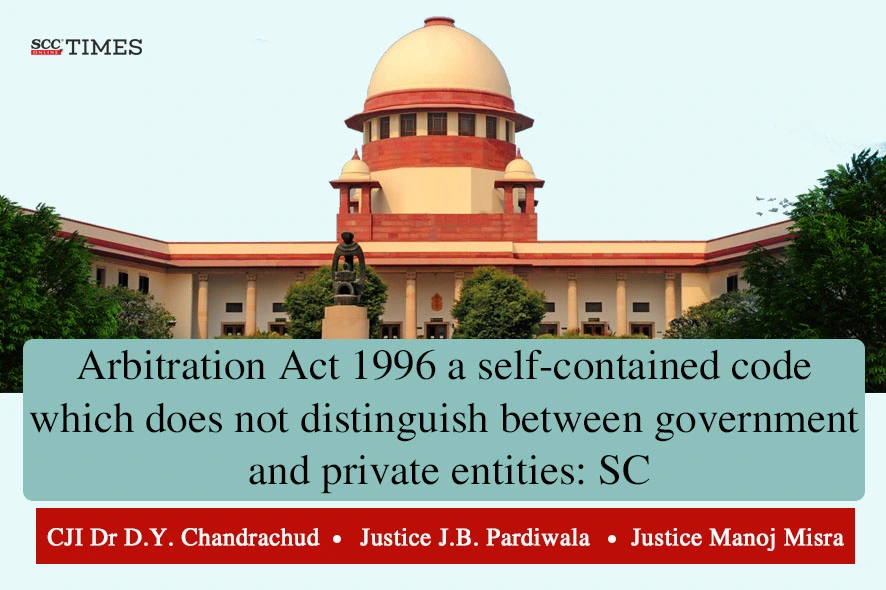Supreme Court: The instant appeal challenged Madras High Court’s order that was passed in an interlocutory proceeding during the pendency of the Section 34, Arbitration and Conciliation Act, 1996 challenge, wherein the High Court had stayed the operation of an arbitral award on the condition that a bank guarantee be furnished in respect of the principal amount awarded. The 3-Judge Bench of Dr DY Chandrachud, CJ*., JB Pardiwala and Manoj Misra, JJ., stated that the Arbitration Act is a self-contained code, which does not distinguish between governmental and private entities. Hence, the decision of the Court cannot be influenced by the position of the party before it and whether it is a fly-by-night operator. It was further stated that an assessment as to whether a party is reliable or trustworthy is subjective.
“Many private entities, too, may rely on the size of their undertaking, its success, public image, or other factors to argue that they are not fly-by-night operators. In the absence of any provision of law in this regard, it would be inappropriate for courts to apply this standard while adjudicating the conditions upon which a stay of an award may be granted”.
Legal Trajectory and Contentions:
International Seaport Dredging Pvt. Ltd. (appellant) and Kamarajar Port Limited (respondent) entered into a contract for Capital dredging of Container Berth and Multi Cargo Berths and their approaches; capital dredging of coal berths; removal of onshore boulders and transportation to the designated area; removal of offshore boulders and transportation to the designated area; removal of offshore identified debris/wrecks; and environmental monitoring.
These tasks were to be completed on or before 11-4-2017. Thereafter, disputes arose between the parties. The appellant invoked the arbitration agreement, and the arbitral proceedings commenced. The 3-member Arbitral Tribunal made an award on 7-3-2024 directing the respondent to pay the appellant a sum of Rs 21,07,66,621 towards the claims that were allowed in its favour; pay the appellant interest on the amount awarded at the rate of 9% per annum from 15-11-2017 until the date of the award if the payment was made within three months, and, if not, at the rate of 12% per annum from the date of the award till the date of payment; and pay the appellant Rs 3,20,86,405 by way of costs.
Both the parties filed applications under Section 33 of the Arbitration and Conciliation Act 1996 for correction of the award and for additional arbitral awards. The Arbitral Tribunal dismissed the application filed by the respondent. It allowed the application filed by the appellant only to the extent of increasing the costs awarded to it by Rs 12,00,000 to reflect the fees paid to the arbitral tribunal subsequent to the parties filing their memo of costs.
The respondent challenged the arbitral award under Section 34 of the Arbitration Act and moved an application for stay of execution. The High Court, by its impugned judgment and order dated 9-9-2024, granted a stay on the execution of the award conditional on the respondent furnishing a bank guarantee in the sum of Rs 21,07,66,621 within a period of 8 weeks.
Counsel for the appellant contended that since the award operates as a money decree under Section 36 of the Arbitration Act, the High Court was not justified in directing merely the furnishing of a bank guarantee in relation to the principal amount. The appellant contended that the respondent should have been directed to deposit the amount awarded to it as a condition for the grant of a stay on the execution of the award. It was argued that the sanctity of arbitration must be preserved by requiring the deposit of the amount awarded as a condition for the stay on the enforcement of the award. It was further argued that the High Court, while ordering a stay, had essentially furnished only two reasons. The first reason pertained to the question of cess, while the only other reason is that the respondent is not “a fly by operator”.
Per contra, the respondent argued that the High Court had due regard to the fact that the respondent is a statutory body and correctly held that security should be furnished in the form of a bank guarantee. It was further argued that amended provisions of Arbitration Act, 1996 incorporate provisions of the CPC as regards ordering a stay of an award which contains provisions for the payment of money.
Court’s Assessment:
Perusing the matter and Section 36 of Arbitration Act, 1996, the Court noted that in the instant case there is an arbitral award to the tune of approximately Rs 21 crores in favour of the appellant. The High Court, while issuing a direction for furnishing of a bank guarantee, dealt with only one of the claims which was awarded by the arbitral tribunal, namely, that which pertained to the refund of the cess under the Building and Other Construction Workers’ Welfare Cess Act 1996. It was further noted that apart from discussing this claim, which was in the amount of approximately Rs 3 crores, the High Court did not address the other claims of the appellant which were allowed by the arbitral tribunal. The amount awarded in relation to the remaining claims is approximately Rs 18 crore.
Taking note of Madras High Court’s reasoning to stay the operation of the award that the respondent is not a fly- by operator and is a statutory undertaking, the Court opined that law qua arbitration proceedings, cannot be any different merely because of the status of the respondent as a statutory undertaking.
The Court further said that the High Court made an error in not even prima facie considering the fact that apart from the issue of cess, there was an arbitral award in favour of the appellant in regard to other claims as well. Further, the High Court ought not to have based its decision on the condition for the grant of stay on the status of the respondent as a statutory authority.
Stating that Arbitration Act, 1996 does not differentiate between private and government entities, the Court said that the form of security required to be furnished should not depend on whether a party is a statutory or other governmental body or a private entity. Governmental entities must be treated in a similar fashion to private parties insofar as proceedings under the Arbitration Act are concerned, except where otherwise indicated by law. “This is because the parties have entered into commercial transactions with full awareness of the implications of compliance and non-compliance with the concerned contracts and the consequences which will visit them in law”.
Explaining that under Order XLI Rule 5 of CPC, the Court has the power to direct full or part deposit and/or the furnishing of security in respect of the decretal amount, the Court therefore, modified the High Court’s order, with the following directions:
-
The respondent shall deposit an amount quantified at 75% of the decretal amount, inclusive of interest, on or before 30-11-2024 before the High Court.
-
Conditional on the deposit of the aforesaid amount within the period stipulated above, there shall be a stay on the enforcement of the arbitral award.
CASE DETAILS
|
Citation: Appellants : Respondents : |
Advocates who appeared in this case For Petitioner(s): For Respondent(s): |
CORAM :









